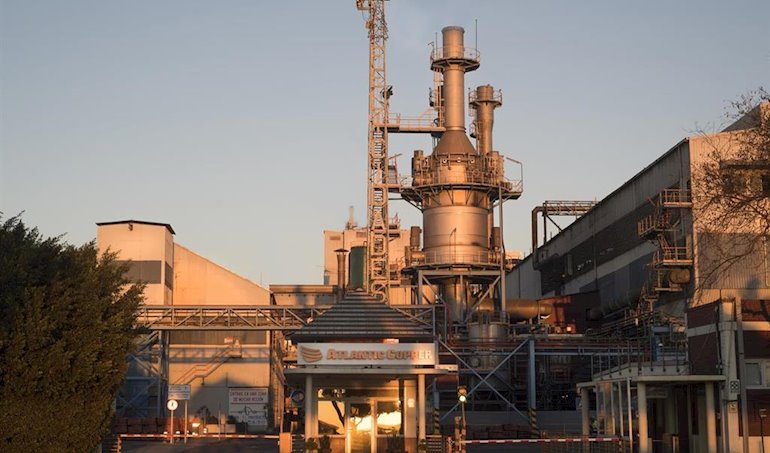
Atlantic Copper green credentials recognised by Spain’s BBVA

Sustainability has been a long-standing issue in metals, covering a range of topics including corruption, governance, communities around mines and mine waste.
But environmental concerns have moved to the top of the agenda in recent years with heightened awareness of climate change amid public protests.
Metals and mining are responsible for 10% of the total impact on climate change, according to the United Nations Environment Programme.
The “green” loans along with credit lines of 25 million euros were agreed with Spanish bank BBVA earlier this year and recognise Atlantic Copper’s efforts to cut energy consumption at its smelter in Spain.
“We have greatly reduced our energy consumption through innovation and we are looking to cut even further by, for example, recovering heat and turning it into power,” Targetta said during London Metal Exchange Week.
“We are also looking for opportunities in the circular economy, looking for ways to recycle a variety of materials.”
Targetta said the credit line was in recognition of meeting environmental, social and corporate governance standards as assessed by French rating agency Vigeo Eiris.
According to consultancy Wood Mackenzie, the Atlantic Copper smelter is one of the world’s most efficient in terms of energy consumption per unit of copper in concentrate.
“The smelter has a dedicated department that supervises energy efficiency, plans and programmes to follow their performance in this regard throughout the year,” Wood Mackenzie analyst Leonardo Meza Standen said.
Owned by Freeport McMoRan, Atlantic Copper produces around 300,000 tonnes of copper a year. About half of that is for local consumption and the rest is exported.
BBVA’s website says the bank plans to deploy 100 billion euros in green financing and sustainable infrastructure between 2018 and 2025.
($1 = 0.8996 euros)


Trump weighs using $2 billion in CHIPS Act funding for critical minerals

Codelco cuts 2025 copper forecast after El Teniente mine collapse

Electra converts debt, launches $30M raise to jumpstart stalled cobalt refinery

Barrick’s Reko Diq in line for $410M ADB backing

Abcourt readies Sleeping Giant mill to pour first gold since 2014

Nevada army depot to serve as base for first US strategic minerals stockpile

SQM boosts lithium supply plans as prices flick higher

Viridis unveils 200Mt initial reserve for Brazil rare earth project

Tailings could meet much of US critical mineral demand – study

Kyrgyzstan kicks off underground gold mining at Kumtor

Kyrgyzstan kicks off underground gold mining at Kumtor

KoBold Metals granted lithium exploration rights in Congo

Freeport Indonesia to wrap up Gresik plant repairs by early September

Energy Fuels soars on Vulcan Elements partnership

Northern Dynasty sticks to proposal in battle to lift Pebble mine veto

Giustra-backed mining firm teams up with informal miners in Colombia

Critical Metals signs agreement to supply rare earth to US government-funded facility

China extends rare earth controls to imported material

Galan Lithium proceeds with $13M financing for Argentina project

Kyrgyzstan kicks off underground gold mining at Kumtor

Freeport Indonesia to wrap up Gresik plant repairs by early September

Energy Fuels soars on Vulcan Elements partnership

Northern Dynasty sticks to proposal in battle to lift Pebble mine veto

Giustra-backed mining firm teams up with informal miners in Colombia

Critical Metals signs agreement to supply rare earth to US government-funded facility

China extends rare earth controls to imported material

Galan Lithium proceeds with $13M financing for Argentina project

Silver price touches $39 as market weighs rate cut outlook

















